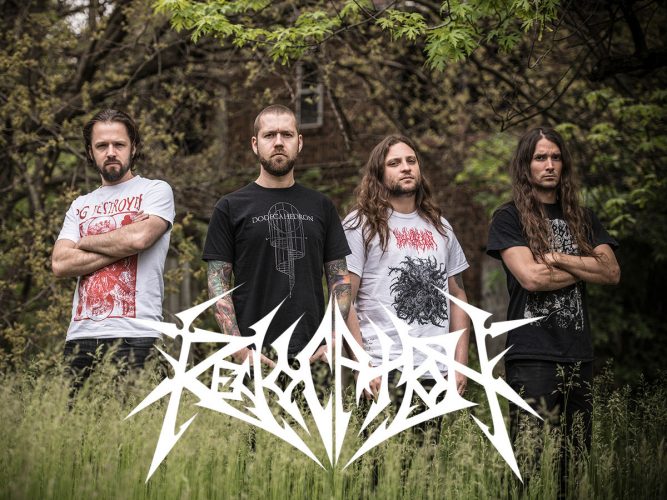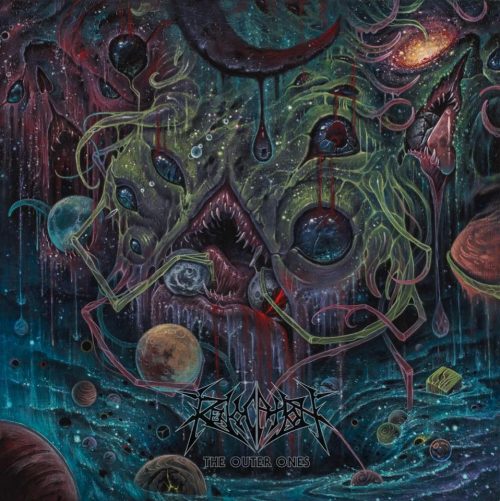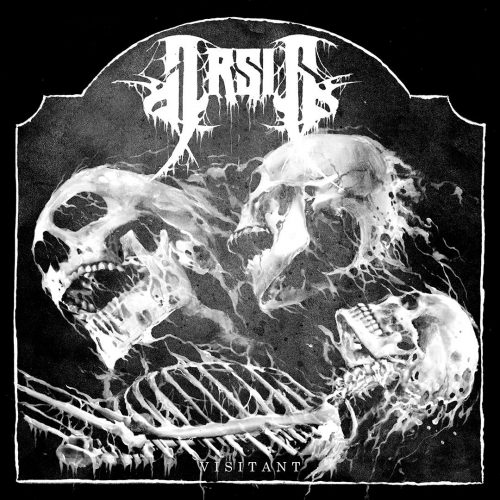(In this post Andy Synn reviews both The Outer Ones, the new album by Revocation (released by Metal Blade on September 28th), and Visitant, the new album by Arsis (which will be released on November 2nd by Nuclear Blast and Agonia Records).)
It doesn’t take a genius to identify the multiple similarities between the career progression(s) of Arsis and Revocation.
Both bands have become pretty big names in (and around) the Tech Death sphere, both bands are fronted by an impressively talented vocalist/guitarist (James Malone and David Davidson, respectively), and both bands have a rather notable ’80s Metal obsession bubbling away under the surface (stadium-sized Hair Metal in the case of the former, classic Thrash for the latter).
But the similarities don’t end there.
Not only are both bands pretty cover-happy (Revocation have, to date, released covers of Exhorder, Death, Metallica, Morbid Angel, and Slayer, while Arsis have pursued a slightly more eclectic path, covering tracks from Alice Cooper, Depeche Mode, and Corey Hart… as well as a mooted King Diamond cover which, for some reason, never saw the light of day), but both groups also participated in the Scion A/V EP programme in 2012, leading to the creation of the Leper’s Caress and Teratogenesis EPs.
And, even more recently, both bands have just produced (or are about to produce) brand new albums which are amongst the heaviest, and most Death Metal focussed, of their careers.
For Revocation this means shifting their focus ever so slightly to incorporate a heftier helping of meaty, deathlier riffs, an extra dose of blasting ferocity, and an extra serving of grittier, more guttural vocals, all of which are in evidence throughout the pulverising opening pair of “Of Unworldy Origin” and “That Which Consumes All Things”.
And while both these tracks still contain their fair share of finger-shredding thrashery and neck-wrecking hooks, they’re also considerably darker, and more direct, than what one might expect from a “traditional” Revocation song.
Now, I’ve seen some people complaining that The Outer Ones lacks the sort of semi-chaotic unpredictability which made the band’s earlier work, particularly the sublime Chaos of Forms, such a mind-bending delight, but while it’s true that their seventh album feels (arguably) almost straightforward by comparison to the more fractious and frenetic sound of their first few records, that doesn’t mean the band have settled down, and the angular aggression and proggy permutations displayed on cuts like “Blood Atonement” and “Fathomless Catacombs” demonstrate that the current incarnation of Revocation is just as capable of flipping the script when they want to.
It’s perhaps telling that these two tracks follow on immediately from the initial blitzkrieg of “…Origin” and “That Which Consumes…” – especially since the back half of the record leans even more heavily on the group’s newly reinvigorated Death Metal side (both “The Outer Ones” and “Luciferous” are easily amongst the heaviest tracks in the band’s back-catalogue) – as a way of reassuring their long-term fans that they haven’t lost their penchant for employing some truly oddball and off-kilter song structures, and that this continues to hold true for the surprisingly epic, progressively arranged closer “A Starless Darkness”, which does its best to fuse the more esoteric elements of the band’s sound with their newfound love of dirty, down-tuned Death Metal riffage.
Now for Arsis this move towards a more Deathly sound is most evident in two ways.
First, as you’ll no doubt have heard on the album’s first single (and opening track) “Tricking the Gods”, James Malone’s cadaverous snarl has taken on an even harsher, more aggressive, edge to it this time around, which some fans might find a little off-putting at first, but which I guarantee you will soon make a lot of sense when you discover just how much harsher and more aggressive the accompanying music is.
Second, the musical style on Visitant errs closer to the twisted, barbed-wire technicality of We Are The Nightmare than it does either of its two predecessors, resulting in a listening experience which is a lot more complex and challenging (though still cruelly compelling) than one might expect from the band who wrote such lethal anthems as “Beyond Forlorn” and “Handbook For The Recently Deceased”.
But while this is a noticeably nastier, more visceral album than one might have expected from Malone and co., it still retains all the hallmarks of the classic Arsis sound, as well as throwing a few new and intriguing twists into the story.
For one thing, there’s so much bass on this album, it’s almost ridiculous. It’s as if, when they decided to return to the crippling technicality of We Are The Nightmare, the band also decided to over-compensate for that album’s infamous lack of low-end presence and just allow bassist Noah Martin to go absolutely nuts this time around… and he does not disappoint.
Similarly, as blisteringly frantic and insanely busy as this album can be at times (both “Easy Prey” and “As Deep As Your Flesh” are prime …Nightmare fuel), the Arsis crew still know how to rock when they need to, and have clearly taken great care to pack this album with as many big, bombastic riffs and showboating solos as they think they can get away with.
The blast-fuelled belligerence of “Hell Sworn”, for example, also delivers a metric fuckton of suitably hellish hooks and hip-thrusting riffs in just over four minutes of metallic fury, while both “Funereal Might” and “Dead Is Better” prove that it’s possible to blend tormented technicality and headbanging heaviness without having to compromise on either.
Then of course there’s the moodier, chunkier heaviness provided by “Fathoms” and “A Pulse Keeping Time With The Dark”, which – much like Revocation have done on their latest album – find Arsis pursuing a darker, and more direct, take on their signature sound, one that’s both groovier and gloomier, but still fret-blazingly bombastic.
It’s going to be interesting to see how both these albums turn out for both bands.
Arguably, all things considered, these records should be less successful than their previous efforts, because they’re clearly (and purposefully) heavier, darker, and less listener-friendly than either Great Is Our Sin or Unwelcome were.
But then… this is the Metal scene. And sometimes unfriendly is exactly what people are looking for. So there’s every chance that, paradoxically, both these albums could push both bands to new critical and commercial heights.
Only time will tell.



